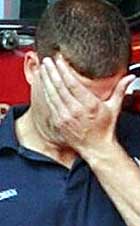| FDNY'S
TRAUMA ON RISE
PAIN:
These are just three of the thousands of city firefighters who, medical experts say, are increasingly angry, anxious and frightened some 17 months after the World Trade Center was destroyed. The pain can manifest itself in many ways - from feeling unsocial at a party to a full-blown case of post-traumatic stress disorder. Experts describe the firefighters' emotions as similar to soldiers in front-line combat. What they're going through is "very typical after this kind of trauma," said Dr. James Gordon, director of the Washington-based Center for Mind-Body Medicine. "The amount of loss was enormous," Gordon said, referring to the 343 city firefighters who died on Sept. 11, 2001. Firefighters don't normally talk about their torment. Many fear that showing what is seen as weakness will lose them the trust of their colleagues. But with the pain still so great, a few are willing to speak out - anonymously. One firefighter said he has undergone therapy and medication, but it hasn't helped. "I'm sometimes scared," he said. "I'm on a roller coaster that won't stop." He also said he's concerned about his co-workers' "massive consumption of alcohol." Another just wants out of his job. "I wish I can fall off the Fire Department map," he said, choking back tears. "I need to be with my family." The wife of another firefighter doesn't know how much longer her marriage can last. "He's a wreck. He's a horror to live with," she said. On 9/11, her husband arrived at the World Trade Center as the first tower fell. For days, the firefighter - now on medical leave - carried out his dead comrades and parts of their bodies. First came the nightmares. Then the depression and anger. "He lives on anti-depressants and sleeping pills," she said. Last month, Malachy Corrigan, director of the FDNY Counseling Services Unit, listed the primary diagnoses of the 3,800 firefighters, officers and EMS responders his office saw between Sept. 11, 2001, and Dec. 31, 2002. The top five primary diagnoses were anxiety (roughly 1,400 cases); marital and couple problems (800); alcohol problems (400); depression (320); and post-traumatic stress disorder (230). "We know it's there, but we don't discuss it," said Lt. Kevin Guy, who retired in November because of asthma. "How could anybody not be affected by [9/11]?" |
|
|
|
|

 February
18, 2003 --
February
18, 2003 --